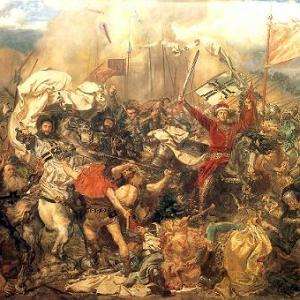The Knights of the Cross

The Knights of the Cross (Polish: Krzyżacy) is a 1900 historical novel written by Henryk Sienkiewicz, a Polish writer and Nobel laureate. The novel was written during the partitions of Poland, with most Poles living in the Russian Empire province Privislinsky Krai, formerly Congress Poland. One of Sienkiewicz's goals in writing The Knights of the Cross was to encourage and strengthen Polish national confidence against the occupying powers of Austria, Prussia, and Russia. To circumvent Russian censorship, Sienciewicz placed the plot in medieval Prussia (region) and the State of the Teutonic Order. He used offences occupiers (well known to his readers from the newspapers) perpetrated in his own time by the Russians to fill in the details.
The history of the actual religious military order of The Teutonic Knights, which from the 13th to the 16th centuries controlled large parts of the Baltic Sea coast, and its defeat in the Battle of Tannenberg (1410)/ Battle of Grunwald by Poles and Lithuanians, serves as the backdrop for the story. The novel also focuses extensively on medieval life and customs in both the cities and the country in medieval Poland.
The novel inspired a 1960 film adaptation which was one of the most popular Polish films up to that point.
- Action Girl: Jagienka, as far as the setting permits. She doesn't take part in any actual fighting, but hunting on her own definitely counts.
- Exclusively Evil: The Teutonic Knights are the obvious villains in the story
- Break the Cutie : Danuska. It ended killing her
- Driven to Suicide: One of the villains responsible for Danuska's death and the blinding of Jurand is captured by the heroes and subsequently kills himself when Jurand orders him set free.
- Also, while the army is marching towards Grunwald, the Lithuanian prince Witold learns that two of his soldiers have plundered a church on the way. He becomes so furious he orders them to build gallows and hang themselves: which they do in all haste, fearing he might get more creative if they keep him waiting.
- Eyepatch of Power: Jurand
- Guile Hero: Macko. While he is just as capable as Zbyszko in a fight, Macko also seems to do the thinking for both of them. This is most evident when he tricks two of Jagienka's hot-headed suitors into guarding her from each other while Zbyszko is away.
- Improbable Age: Zbyszko. While Sienkiewicz did plenty of research for the book, he Did Not Do the Research for character ages. Eighteen is impossibly old for a squire.
- The Late Middle Ages: Their negative aspects are downplayed for the Poles (for whom this was something of a Golden Age), but played straight for The Teutonic Knights.
- Snake Oil Salesman: Sanderus, a comedy relief friar who sells indulgences, along with some ridiculously fake religious relics (he can sell you some sweat of St. George, from his fight with the dragon! Really! )
- Trial by Combat - the most famous example in Polish literature
- Twenty Bear Asses: In order to impress Danuska, Zbyszko vows to get some peacock feathers from the helmets of The Teutonic Knights he defeats. This almost gets him executed when he accidentally attacks an envoy.
- Unskilled but Strong: When asked to choose the weapons for the duel, Zbyszko chooses axes. The narrator states that it is a good choice since his opponent is much more experienced and would be at a serious advantage in a sword fight.
- Unstoppable Rage: Jurand, when the captors of his daughter push him too far. Zbyszko during the duel.